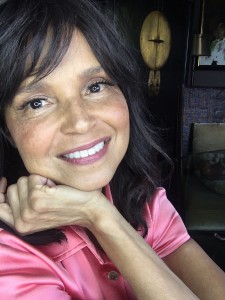Victoria Rowell is a true hyphenate. Originally from Portland, Maine, Rowell started out as a ballet dancer, then branched out into acting. Some of her better-known performances include work in DUMB AND DUMBER, EVE’S BAYOU, her eight seasons on DIAGNOSIS MURDER, and her work as Drucilla Barber Winters from 1990 through 2019 on THE YOUNG AND THE RESTLESS, for which Rowell received eleven Image Awards and three Daytime Emmy nominations.
Rowell is also a best-selling nonfiction author, whose memoir, THE WOMEN WHO RAISED ME, has continuously been in print for the past thirteen years. As a screenwriter, she has created, executive produced and directed two series, THE RICH AND THE RUTHLESS and JACQUELINE AND JILLY, playing roles in both. She also has the home renovation series TRASH VS. TREASURE.
Rowell appears in two dramatic shorts as part of BET Her’s streaming channel, which both premiere on Saturday, October 17 under the umbrella title THE WAITING ROOM. LIKE, COMMENT, SUBSCRIBE is directed by Sheryl Lee Ralph; A LONG LOOK IN THE MIRROR is helmed by Vanessa Bell Calloway. Rowell plays Dr. Williams in the two films, both of which deal with breast cancer in the Black community. The premiere is tied to Breast Cancer Awareness Month.
In an exclusive two-part telephone interview, Rowell talks about working both in front of and behind the camera during the COVID pandemic, and being a Black hyphenate in Hollywood today.
ASSIGNMENT X: THE WAITING ROOM is on BET HER. Is that an offshoot of BET?
VICTORIA ROWELL: Yes, it’s part of BET. BET has three incarnations. It’s Viacom/CBS. You have BET – Black Entertainment Television. Then you have BET Plus, and then you have BET Her, which is very specific, strong, female Black-led storytelling. BET HER has a series of shows for Breast Cancer Awareness Month, housed on a show called THE WAITING ROOM.
I directed a movie for [BET Her] this summer in Maryland on mental health, called EVERYTHING IS FINE, which aired in July, as a part of a suite of movies they shot. Kim Fields also shot one.
AX: Did BET Her approach you to direct this, was this an idea you had that you took to them …?
ROWELL: No. I was approached by the producer, Tressa Smallwood, who runs MegaMind Media, and they invited me to direct this summer. EVERYTHING IS FINE is about a family’s journey, and their denial, about their son having schizophrenia. So that was an incredible opportunity, especially during COVID. With self-isolating, there’s been an uptick in mental illnesses and suicides reported in the news, and people are really struggling with mental health during COVID. So BET Her dedicated two movies this summer, and got them on the air right away, which I thought was heroic. I was invited to do that, and then I was also invited to be on-camera talent, playing the role of Dr. Williams, who is an important linchpin in both [WAITING ROOM] movies, who delivers the hard news that these young women have breast cancer.
AX: So, it’s Dr. Williams’s waiting room we’re in?
ROWELL: You could say.
AX: Since both your directorial project EVERYTHING IS FINE and the two segments of THE WAITING ROOM were shot during COVID, what were the challenges of making those?
ROWELL: That’s a good question. I just got finished producing and directing the fourth incarnation of THE RICH AND THE RUTHLESS. a rom-com soap opera series, on Amazon Prime Video and AMC Networks and UMC TV streaming service, and the challenges are what the protocols demand. I had to have, and also on the movies that I was in back East, there had to be an on-set medic. Every day of shooting, your temperature is taken upon arrival, and temperature taken at lunch. There’d be an on-set nurse, taking rapid testing. Each meal now has to be individually wrapped, so that’s an additional expense for production. All the PPE has to be purchased for set. [There must be] sanitizing of the employees who pass out the meals, so there’s only one person touching the food. There are myriad additional expenses that have to go into the budget.
AX: As far as blocking and staging shots, do you have to have all of the actors six feet apart? Are all of the actors wearing masks? How do you do that?
ROWELL: With care. I’ll talk to you from behind and in front of the camera perspectives. I’ll start with playing the role of Dr. Williams. I wore a mask right up until it was time to recite my lines. There can be no more than ten people in any set space. So you have a skeletal crew in the space. You have the camera person. Makeup and hair is out of the room. They’ve done their last touches. You walk into your set, ready to go, and the other actor, or actors [do likewise]. I always felt safe. Tessa Smallwood, who was our executive producer, who works with Viacom/CBS/BET Her, took the utmost care to make sure we all were safe. I never felt compromised at all. As a director, I had the same cover by her company. I directed EVERYTHING IS FINE this summer. On my own set of THE RICH AND THE RUTHLESS, again, I took every precaution, and of course I’m mandated by SAG-AFTRA that these protocols must be adhered to, or your production will be shut down that day, and rightly so. So, a SAG rep visits your set, makes sure you’re adhering to the rules. Who doesn’t want to adhere to the rules?
AX: In staging, are you allowed to put your actors closer, or when you’re acting, are you allowed to be closer than six feet, or does it just have to be shot to make it looks like you’re closer, or in fact, do you want to shoot it to emphasize that the distance is being maintained?
ROWELL: Depending on the scene – for example, in [THE WAITING ROOM], I’m in two different office spaces in both of those movies. So, there was ample distance between the parents and the actress playing the patient in one movie, Golden Brooks, and myself. I think that there’s a good opportunity to have the conversation with the director, with the producer, the other actors in the scene, what they feel comfortable with. I think that every actor has the opportunity to determine if they want to wear a mask in their scene, or partially in their scene. I think when actors wear a mask in a scene, it works great. Wear a mask in your scene, but I’m not saying in this particular show. I’m not talking about the BET Her movies, I’m talking about choices that actors are making, if I can generalize.
There are actors who will wear a mask in a scene. These are shows that are playing COVID. There are shows that are not playing COVID, but in shows that are playing COVID, where they’ll pull down their masks briefly, recite their lines, and put their masks back up. There are actors that are saying their lines through a mask. But in LIKE, COMMENT, SUBSCRIBE, and the movie A LONG LOOK IN THE MIRROR, which are the two BET Her movies which I appear in, I elected to wear my mask right up until I recited my lines, and said my lines without the mask on. And that’s actor testing negative, having a consensus – the director is not even in the room. The director has to be in another space, in video village. So it really is between the two actors.
AX: Does having much fewer people on the set give the scenes a more intimate feel?
ROWELL: Well, I said from the beginning, “This is like having a closed set all the time.” I personally love it. It’s less distraction. It’s just the camera, the camera operator, the actors, and that’s it. I mean, even pulling focus, that person’s in another space, because it’s all done digitally. So, it’s very intimate. And of course, the camera operator has a mask on.
AX: Is the sound recording person in there, too, or are they also in another room?
ROWELL: It depends. If you’re wearing a lav [have a lavalier microphone attached to hair or costume], they’re in the other room. Obviously, if [a sound technician] is in there, then they want to boom it [use a boom microphone, held out of camera range, above the actors’ heads]. The boom has been used, more often than not, because it mitigates having to get close to an actor in assisting with placing a lav on them. So, we’re trying.
For example, where you’ve typically worn a lav in the scene, maybe you may not wear a lav in the scene, because the boom offers more safety in some cases, so that there’s no person-to-person contact. Or, in cases which I’m seeing more and more of, the sound person trusts that you’re going to respect the equipment, and lav yourself, and will tell you where to adhere the mic. And there’s been a lot of success. Actors are getting very savvy at putting their own lavs on. Of course, another precaution is that each department, that person can only touch their own equipment, and then sanitize it.
AX: As as a director, are you in that situation where you’re off-set in video village?
ROWELL: Yes. I’m off-set in video village. I give my actors masks, and also, we are requested to wear face shields or goggles if we’re going to be in close proximity, to protect the actors and oneself. Actors are really, in my opinion, the most exposed people on a set. Actors are courageously performing, and there’s got to be a lot of trust and faith that protocols are being adhered to. And quite frankly, we can’t be in production if we’re not adhering to these rules.
AX: As a director, is it problematic for you to be in video village and not directly on the set?
ROWELL: Oh, no.
AX: Are there things you do as a writer to make things safer?
ROWELL: Yes. For example, on THE RICH AND THE RUTHLESS, which we wrapped [in late September], I purposely penned the majority of the show as an exterior season, because of COVID, so that our locations were on the beach, in Malibu, or at a dude ranch. We’re outdoors on locations. So COVID is driving narrative, I think, for many scripts. And certainly, intimacy scenes have to be modified, so that you are able to bring forth the imagination of romance, the essence of romance, but there are creative ways that you can do that without people in a full lip-lock.
AX: So you imply that they’re in proximity, but they’re not really.
ROWELL: Yeah. Or after, post-coital. I pull from my old soap opera tricks to pan from the couple, and pan to flames. There are ways to do it, to imply that romance is in session.
AX: You spent quite a while on soap operas in your career. Is THE RICH AND THE RUTHLESS a parody of anything particular you encountered, or is it just more a general soaps parody?
ROWELL: It’s not really a parody. It is a dram/com series. It’s more satirical. It’s a composite of a lot of my Hollywood experience in some ways, whether it’s primetime, daytime, film, or theater, from my ballet background. There’s a lot of material from theater that I include. But certainly, having been in the genre, I have a unique experience of knowing how the machine works. So that is very helpful. But these are all original characters and stories. And it’s [a story about] a behind-the-scenes soap opera, the only Black-owned soap opera in Hollywood, and we constantly arm-wrestle with the studio, and within the family, and the cast of characters. There’s a lot of comedy and a lot of drama in it, because there’s no other genre of entertainment that dares to execute fifty-four pages a day.
AX: That is a frenetic pace. I know some actors don’t want to do soaps because they can’t cope with memorizing that amount of material in that short a space of time …
ROWELL: [laughs] I think one of the record days for me was over thirty pages. When I first came onto THE YOUNG AND THE RESTLESS, first of all, there’s a mountain of scripts, waiting for you to study, and you’re apoplectic initially, because it’s so overwhelming. However, in time, you adjust. The brain is a muscle that can be trained, just like any muscle. And I did have the advantage of theater, and classic ballet, and how to study and rehearse all that choreography.
[The soap opera] is an incredible and daunting form of entertainment. I remember we had a guest star, a wonderful actress who’d been on FALCON CREST, Joan Van Ark. When she came on the show, she was a consummate professional, but she was amazed at the amount of dialogue that was required, and the pace that we’d go at. Even for a seasoned actor, it is quite daunting.
AX: You said this is the fourth incarnation of THE RICH AND THE RUTHLESS. Do you just mean this is its fourth season, or did the show actually shut down and have to be brought back?
ROWELL: We have three seasons up and running on Amazon Prime Video, and again, on umc.tv, which is an AMC network. The fourth season I produced on spec, and I can’t go into more detail [as to where it will be available] right now, but I will say there’s strong interest.
Related: Exclusive Interview with multi-hyphenate Victoria Rowell – Part 2
Follow us on Twitter at ASSIGNMENT X
Like us on Facebook at ASSIGNMENT X
Article Source: Assignment X
Article: Exclusive Interview with multi-hyphenate Victoria Rowell on working during COVID – Part 1
Related Posts:













